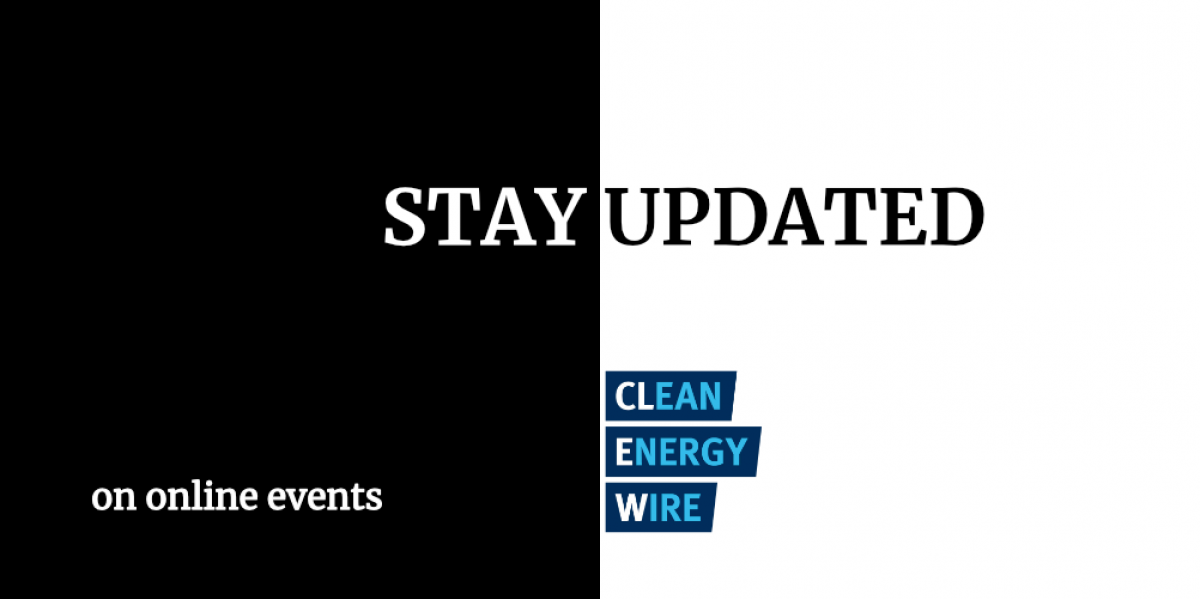Stay updated on online journalism and energy events
LAST UPDATE 09/01
[Updated with webinars from FSR, UNEP FI, C2ES, WRI, CCNow, Aurora Energy Research]
|
14/01, 16.00 CET |
Webinar - Corporate Climate Resilience in Practice: Insights from the 2025 Foresight Series Organiser: Center for Climate and Energy Solutions (C2ES) Companies are facing worsening climate-related risks that challenge infrastructure and operations, workforce health, supply chains, and overall competitiveness. In 2025, C2ES and Resilience First convened the Corporate Climate Resilience Foresight Series, engaging senior leaders from two dozen global companies to examine how organizations can build climate resilience across systems, not just single facilities. This webinar launches the publication Building Corporate Climate Resilience: Key Insights from the 2025 Corporate Climate Resilience Foresight Series and distills it into main findings and proposes actions for corporate leaders across different roles that can help build their climate resilience. Speakers will explore how internal governance structures can enable resilience, and where external drivers—such as investors, regulators, customers, and insurers—can enhance the business case for integrating climate resilience across business functions. Participants will also hear examples of how companies are integrating climate risk into workforce protection and community partnerships. You can find more information here and register via this link. |
|
14/01, 10.00 CET |
Webinar - Watt’s Next? A 2025 Battery Round-Up Organiser: Aurora Energy Research Europe’s battery storage sector has experienced another year of exceptional growth in 2025, driven by surging renewable integration, grid challenges, and strong policy support. This year alone, 6.9 GW of battery energy storage capacity became operational across Europe – a record-breaking achievement. As the market evolves rapidly, flexibility in the power system has advanced significantly, while signs of maturity are emerging through full pipelines and innovative business models such as tolling. Join this Pan-European session to explore the key developments shaping the grid-scale battery energy storage market in 2025. You can find more information here and register via this link. |
|
14/01. 18.00 CET |
Webinar - The Climate Story in 2026 Organiser: Covering Climate Now (CCNow) Venezuela’s oil future. Worsening climate impacts, despite soaring clean energy. Elections in the US, Brazil, and Bangladesh. A potential post-COP30 surprise. The 89% Project’s next phase, and much more. How do we as journalists cover the big climate stories in 2026? And how do we get industry colleagues, in our own newsrooms and beyond, to join us? Hear from climate luminaries Mohamed Adow, director of Power Shift Africa; Fiona Harvey, an environment editor at The Guardian; and writer and activist Bill McKibben while also sharing your views about how journalism in all its forms can rise to the moment in 2026. Mark Hertsgaard of CCNow will moderate. You can find more information here and register via this link. |
|
20/01, 14.00 CET |
Webinar - Learning from the Past: lessons for the new Common Agricultural Policy Organiser: Florence School of Regulation (FSR) Join this webinar to explore how lessons from past and forthcoming policy evaluations can enhance the effectiveness, coherence, and impact of the CAP. The Common Agricultural Policy (CAP) remains the cornerstone of the EU’s strategy for sustainable agriculture and rural development. Under the new programming framework (2023–2027), Member States are implementing their CAP Strategic Plans through a performance-based model that aligns national actions with the EU’s economic, social, and environmental objectives. The updated CAP performance evaluation framework places greater emphasis on quantitative, impact-oriented assessments. Member States will now carry out interim evaluations within three years of implementation and final evaluations within two years after the programming period. Although ex-ante evaluations have been discontinued, countries are still required to demonstrate how their interventions address identified needs. This event brings together experts to discuss the practical, analytical, and policy dimensions of evaluating the EU’s Common Agricultural Policy (CAP). It will offer a platform to explore how lessons from past policy cycles can inform the implementation of the new CAP for 2023–2027, particularly regarding Member States’ performance in delivering their CAP Strategic Plans. You can find more information here and register via this link. |
|
21/01, 14.30 CET |
Webinar - Rude Awakening: Shifting Course in a Warming World Organiser: World Resources Institute (WRI) As global temperatures hit alarming new highs and crossing the 1.5°C threshold looks increasingly likely, the world is facing a moment of reckoning. While there has been encouraging progress—such as the rapid uptake of renewable energy and electric vehicles—emissions continue to rise, fossil fuel expansion persists, and most transformation across sectors remain stubbornly slow. With global climate efforts currently off track, and without immediate leadership to drive deep emissions cuts and scale-up finance, more communities will face escalating climate impacts, mounting debt and rising inequality and poverty. Vulnerable countries, particularly in the Global South, are racing against time to build resilience – not only to survive but thrive. Join the Allied for Climate Transformation consortium for a high-level webinar, where policymakers and experts will have a candid dialogue about our planet’s current trajectory for the second half of this critical decade with fresh ideas to deliver breakthroughs the world needs. You can find more information and register via this link. |
|
27/01, 14.00 CET |
Webinar - New Green Shoots 2026: The future is fungi Organiser: UN Environmental Programme, Finance Initiative (UNEP FI) The largest living organism on Earth is a fungus, with the fungal kingdom playing a vital role in many aspects of life as we know it. Join us for an in-depth session, in collaboration with The Future is Fungi Award, on why fungal ecosystems are an important yet overlooked factor in sustainable finance. We’ll explore how fungi underpin key financed sectors like agriculture, real estate, and infrastructure, and the emerging investment opportunities across the fungal bioeconomy, from venture capital to green bonds. We’ll also touch on where fungal health appears in frameworks such as the Taskforce on Nature-related Financial Disclosures (TNFD) and the EU Corporate Sustainability Reporting Directive. The webinar will also outline the policy gaps shaping both risks and first-mover advantages for financial institutions and provide practical guidance for integrating fungal ecosystem indicators into credit risk analysis, underwriting, and portfolio management. Our New Green Shoots webinar series looks at the latest trends in nature finance and is delivered in partnership with the Finance for Biodiversity Foundation, European Business and Biodiversity Platform, and the Principles for Responsible Investment. You can find more information here and register via this link. |
|
28/01, 09.00 CET |
Webinar - Greening the Chinese banking system: A policy and regulatory landscape analysis Organiser: UN Environmental Programme, Finance Initiative (UNEP FI) This webinar presents a new UNEP FI policy brief titled “Greening the Chinese Banking System: A Policy and Regulatory Landscape Analysis”. A conducive policy and regulatory enabling environment is widely recognized as essential for mobilizing large-scale green investment. China offers a particularly illustrative case. With policy support, regulatory requirements, and financial incentives, China’s banking sector has emerged as a powerhouse for the country’s green transition, channeling capital into environmental protection, energy transition, sustainable transport, and other sectors. China has mobilized some of the world’s largest volumes of green investment and has developed highly advanced green tech supply chains. Join us for a discussion of: - Factors have enabled these outcomes - How China’s green finance architecture can be understood in light of its broader policy, industrial, and financial ecosystem - Elements of China’s experience that may offer constructive insights for other countries, particularly those seeking to scale green investment while responding to national priorities and development contexts A presentation of findings and conclusions by lead author Shouqing Zhu will be followed by a discussion of developments and trends in China and the EU and potential areas of collaboration, featuring leading experts who have been active in greening China’s financial system and have served as technical expert reviewers for the development of the brief. You can find more information here and register via this link. |
|
28/01, 10.00 CET |
Webinar - Wired for Growth: Navigating the Future of European Renewables Organiser: Aurora Energy Research Over the past decade, Europe’s solar and wind energy capacity has surged beyond 597 GW, powered by rising demand, favourable policies, increased commodity prices, and improved supply chains. Aurora forecasts a cumulative renewables investment opportunity of over 1,500bn € between 2026 and 2050. To unlock this potential, developers must choose effective business models—be it subsidy schemes, PPAs, or merchant structures—while navigating challenges such as negative pricing, curtailment, permitting delays, and grid constraints that affect financing and market growth. Strategies like co-location and portfolio diversification can help mitigate these risks and attract investment, making it crucial to understand market dynamics, regulations, and risk factors shaping Europe’s renewables future. Join this Public Webinar for key insights from the second edition of our European Renewables Market Overview Report, spanning 28 countries. You can find more information here and register via this link. |
|
29/01,15.00CET |
Webinar - Stories to Watch 2026 Organiser: World Resources Institute (WRI) Stories to Watch 2026 will show how well-designed climate action is delivering benefits today. We’ll explore how countries are using the clean energy transition to spark inclusive economic growth, how climate solutions are helping address the cost-of-living and housing crises, and how investment in green jobs is creating opportunity around the world. Each story will combine insights from WRI experts with on-the-ground videos showing real people and real solutions in action. You can find more information and register via this link, |


